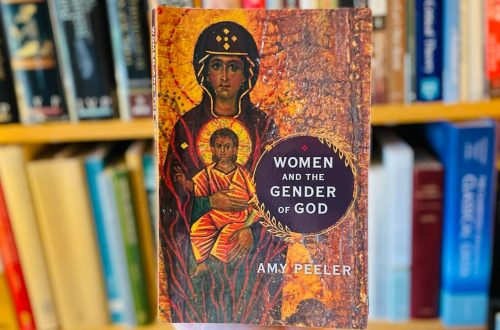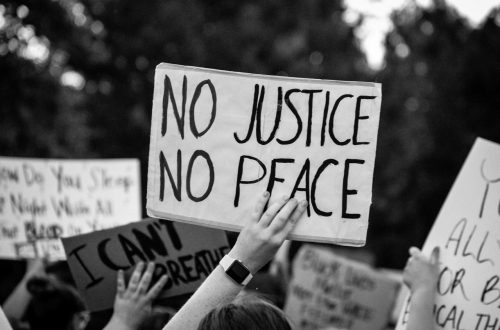 I have never read a story like this one before. Sarah Carpenter, a married woman with two children, becomes pregnant with her third child. After finding out that the child had a disability, she and her husband Andrew make the decision to abort the child in order to spare him from having a bad life.
I have never read a story like this one before. Sarah Carpenter, a married woman with two children, becomes pregnant with her third child. After finding out that the child had a disability, she and her husband Andrew make the decision to abort the child in order to spare him from having a bad life.
The gut-wrenching thing about this story is that everything inside this woman—her conscience, her maternal instinct—is telling her to protect her baby. But her doctor and family members are telling her to spare her child by killing him. In other words, she has a very real sense of what she ought to do, but her conscience collapses underneath the weight of the culture of death. What follows is an extended excerpt from the article in which this mother explains her decision, her abortion, and its aftermath. Read it. Weep. Pray. Maranatha.
And so it was that a week after that first scan, and against my initial instincts, I realised I couldn’t bring this child into the world, knowing the extent to which he would suffer.
Andrew and I talked long into the night, and finally agreed that ending the pregnancy was the kindest thing we could do for our son.
Yet if making that choice was hard, the physical ordeal was only just beginning. At 18 weeks pregnant, I was too far gone for a surgical termination and would have to go through a labour and delivery, under the care of midwives at our local hospital.
The first step was to take the drug Mifepristone to block progesterone, a hormone vital to pregnancy. I swallowed the pill in a side room on the labour ward — the same room where I’d given birth to our younger daughter two years previously.
Over the two days that followed, I fought the urge to put my hands on my stomach when I felt the baby move. Knowing that he was slowly dying inside me was the very definition of hell.
After two days, I returned to the same room to take a second drug to induce labour.
What followed were the worst 16 hours of my life. They passed in a morphine-induced haze, but there was no dulling what was happening.
My baby was being forced into the world long before he could survive in it, and it felt unnatural — completely at odds with my instincts as a mother. My body seemed to be doing all it could to hold onto him, and the labour went on and on.
At one point, in the grips of what felt like a panic attack, I became hysterical. Gasping for breath and screaming, I demanded that Andrew tell me why we were doing this and why it was the right thing for our son.
He calmly described the kind of life we were trying to spare him from, and that we were loving parents, doing what we felt was best.
I demanded to know: ‘If this baby was inside you, not me, would you be on this bed right now, ending his life?’
‘Yes,’ he assured me. ‘I know how hard it must be, and I wish I could take your place.’
I wanted the labour to be over, but I dreaded the end. Having experienced the joy of delivering two full-term babies, I was frightened of how my son would look at 18 weeks’ gestation. At the same time, I knew I had to take the only opportunity I would ever get to hold him.
Andrew, who was by my side throughout the labour, eventually decided to give me some privacy and went for a coffee. The midwife disappeared, too, so I was entirely alone when our son was finally born, asleep, just after 9am on October 12.
Not daring to look at him, I screamed for help — and was alarmed to see the midwife recoil before reaching out to pick him up from the bed.
When Andrew came back he was distressed, and not sure he could bear to look at our son, whom we had long before decided to name George.
However, when George was returned to us, clean and dressed in crocheted clothes no bigger than those worn by our daughters’ dolls, Andrew held out his arms and cradled our tiny son just as lovingly as he had held our two daughters when they were born.
I said George had my husband’s nose, and, as we passed our son between us, tears ran down our cheeks for the child we would never see grow.
It was a struggle to get through the weeks that followed. Our family and friends helped with the children, and before long I was taking my younger daughter to playgroups and ferrying my elder to and from school.
With friends, I was honest about what had happened, but acquaintances shied away from asking what had gone wrong with the pregnancy. When I heard other mothers chatting about shopping or potty training, I wanted to scream: ‘Have you any idea what I’ve been through?’
Everywhere I went, there were pregnant women and babies. I felt irrational anger and resentment that these mothers hadn’t faced the choice of whether or not to abort a disabled child.
I even envied women who had miscarried — something I’d experienced myself, with great sadness, three years previously. But at least those babies hadn’t died at their mother’s hands, and their experiences evoked straightforward sympathy, never vitriol.
Sarah Carpenter, “I saw my son’s bleak future and knew I had to abort him” (The Daily Mail)
(HT: Tim Challies)




5 Comments
Ian Hugh Clary
I wondered if you saw this interview in WaPo with a late-term abortion provider: http://www.washingtonpost.com/politics/washington-doctor-speaks-out-against-ban-on-late-term-abortions/2012/05/20/gIQAOzG7eU_story.html
Reg Schofield
I truly feel compassion and grace towards this mother who succumbed to the Darwinian social outworking of survival of the fittest , which I think the advice to abort “deformed or challenged babies” falls under. However the support both emotionally and financially for parents with children born with extreme health and mental issues is sorely lacking . Not only lacking from government support (which I realize differs from Country to Country ) but from within the Church as well . We must as Christians do a better job in conveying the true sanctity of all life and be willing to support not just with prayers , but financially as well .This is why I’m so thankful that Christian Crisis Pregnancy Centres are flourishing all over North America.
Last thought , I find ironic that after a healthy child is born but sadly suffers a brain injury or is inflicted with some debilitating disease , we don’t “put” them down . However as this culture of death and Atheistic view of life continues to sway the youth , I fear where we are headed . All the more to share the gospel with those like this young mother and others who need to hear good news .
Pingback:
Julie Morgan
My grandson Julien is 13 and has Down Syndrome. My daughter knowing what she and her son would face look to our Savior for daily strength to overcome his disability.
Julien has taught us a new meaning to unconditional love. We see the world in new ways through his eyes that we would have missed otherwise.
What people take for granted we see as a miracle. This is what I consider a miracle…being hearing a word never spoken before has been now spoken, hear him say “You” which is his way of saying “I love you” for the first time, a new skill learned such as a button buttoned on his shirt, winning an event at Special Olympics, those ” A HA” moment when he realizes he “gets it”. Most important miracle of all, he to learned first time a couple of weeks ago tot use sign language to sign “God loves you” in Sunday School…brought tears of joy to my eyes!
We must guard the sanctity of life and pray for those who choose to end their unborn child’s life.They need to find forgiveness and grace through their Lord and Savior, Jesus Christ.
Clifford Morgan
My Grandson Julien may have Downs S. but it doesn’t have him! He stole my heart the first time I met him. He haves only a few limitations of what he can do for himself but no limitation for what he can do for others. He is the meaning of great gift for Grandpas and I love him with all my heart.